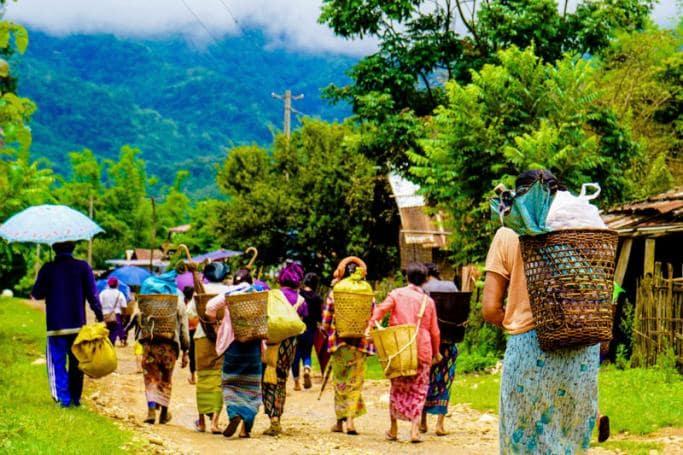There is no denying that the Shan armed resistance groups and the Shan civil society organizations (CSOs) and community-based organizations (CBOs) based in Thailand are intertwined and cannot be separated.
Hideyuki Okano, in his report titled, "Non-Military Transnational Networks of Armed Group: RCSS/SSA in Burma and Shan NGOs in Thailand", published in the Journal of Human Security Studies, Special Issue 2020-1, wrote about the connection between the Shan armed resistance active inside Shan State and the CSOs and CBOs of Shan origin based in Thailand.
“(F)low of migrants from Burma into Thailand has been observed for over a century. Especially, during the late 1990s, large numbers of Shans were displaced in Burma due to the deterioration caused by the civil war, entering Thailand. However, since the early 2000s, the majority of migrants are economically motivated. In Chiang Mai, a city of northern Thailand, local NGOs managed by the Shan people have been actively providing support both to migrants in Thailand (refugees and economic workers) and to internally displaced persons (IDPs) living on the Burmese side of the border.”
There are quite a number of Shan CSOs and CBOs based in Thailand covering Shan and Burma news, Shan refugees and migrant issues, women rights, anti-dam movements, youth empowerment, and education, just to name a few.
But Shan Herald Agency for News (SHAN) now renamed SHAN News launched in 1991 is the pioneer and forerunner of all the Shan CSOs and CBOs based in Thailand. And from them Shan Human Rights Foundation (SHRF), Shan Women Action Network (SWAN), and Shan State Refugee Committee–Thai Border (SSRC-TB), stand out from the rest, particularly where dissemination of news, lobbying, and actual humanitarian assistance are concerned. In fact, the four Shan CSOs and CBOs are linked and worked closely together in many aspects.
However, where helping migrants and refugees are concerned SSRC-TB may be singled out in directly helping the needy Shan diaspora.
According to its website: “The Shan State Refugee Committee (Thai Border) is a community-based organization formed by the committees of five IDP camps, one refugee camp and one refugee/migrant transit center on the Shan-Thai border and by Shan civil society organizations. SSRC has been the main food aid provider to the displaced populations along the southern Shan State–Thai border since October 2017.”
Its vision: “The rights and dignity of displaced communities from conflict-affected areas of Shan State, Burma, are fully protected.”
Its mission: “To address the humanitarian and protection needs of the displaced communities from conflict-affected areas of Shan State, Burma, through a participatory, community approach.”
Its objectives: “To advocate for and provide food aid to the populations of 5 IDP camps and 1 refugee camp along the southern Shan State-Thai border; to promote development of sustainable livelihoods for the camp populations; to build capacity and strengthen the governance of the camp committees; to monitor and document the security situation in and around the camps, and in the rest of Shan State, and provide public updates.”
Concerning its food distribution programme: “The Shan State Refugee Committee–Thai Border (SSRC) has been raising funds through grants and public donations to provide food aid, mainly rice and soya beans, to over 7,000 IDPs/refugees in six camps along the southern Shan State–Thai border.”
For the agriculture and livelihood support: ”Agriculture projects are implemented in 5 IDP camps and 1 refugee camp. There is very little cultivable land in the camps, due to their hill-top locations and shortage of water, but some short#term crops (mushrooms, vegetables, ground nuts, soybeans) and long-term crops (coffee and avocado) are currently being grown.
SSRC has been providing technical support by liaising closely with experienced local farmers, and agricultural professors to assist in skills sharing and monitoring of projects.”
Regarding camp management and development: “The SSRC’s Camp Committee Representatives have been overseeing daily operations, livelihood development and overall well-being and security in each camp. SSRC provides annual workshops and trainings (based on the needs of the camp committee members and the emerging situation), to camp representatives in order to strengthen and enhance their capacity in managing the camps and protecting and promoting the rights of their communities.”
Besides, the SSRC-TB, together with the SHRF, also actively lobby for the protection of the vulnerable over 6,000 displaced villagers in camps along the Shan State-Thai border, exposing security threats from the Myanmar Army and United Wa State Army (UWSA). Responding, for example, when the Myanmar Army on February 2019 fired six 120 mm shells at two IDP locations.
In connection to it, the SHRF and SSRC-TB have called on foreign donor governments: “To pressure the Burma Army to stop militarization and attacks in all ethnic areas of Burma, so that a new inclusive peace process can begin; and to urgently resume food aid to IDPs and refugees in camps along the Shan-Thai border until they can return voluntarily, in safety and dignity to their homes in Shan State.”
Similarly, in April 2021, Loi Kaw Wan IDP camp which is located in southern Shan State-Thai border opposite Chiang Rai province, with about 2,500 IDPs was repeatedly fired upon with 120 mm shells by the Burma Army.
In response to this incident, the SSRC-TB reiterated its urgent appeal to the Thai government to allow these IDPs to cross over into Thailand as soon as attacks start, and to provide them safe refuge, shelter and access to humanitarian aid.
The SSRC-TB Facebook posted ad hoc solicitation to raise fund, “Rice for Life” virtual fund raising concerts, actual donation photos and video podcasts trucks loaded with rice bags and necessary items. However, there hasn't been statistics or clarification on how the organization runs its humanitarian aid projects.












